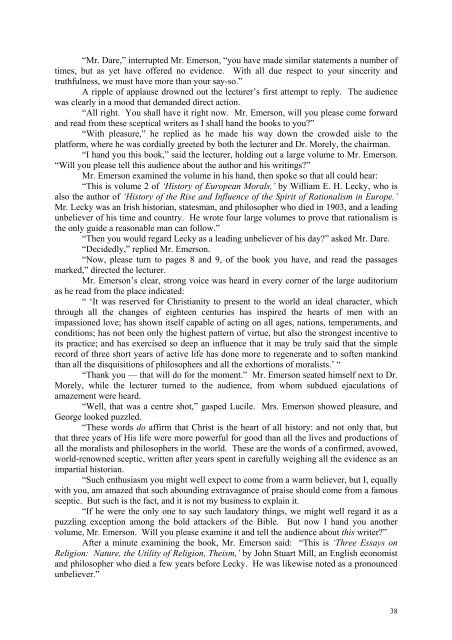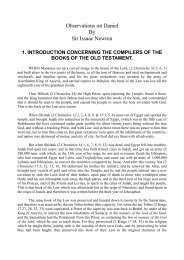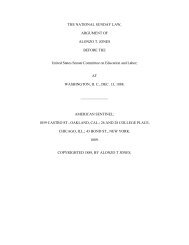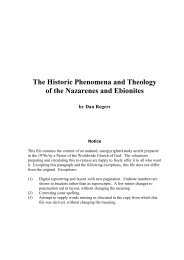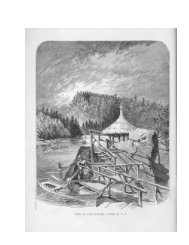Prophecy Speaks (E.A.Rowell).pdf
Prophecy Speaks (E.A.Rowell).pdf
Prophecy Speaks (E.A.Rowell).pdf
You also want an ePaper? Increase the reach of your titles
YUMPU automatically turns print PDFs into web optimized ePapers that Google loves.
“Mr. Dare,” interrupted Mr. Emerson, “you have made similar statements a number of<br />
times, but as yet have offered no evidence. With all due respect to your sincerity and<br />
truthfulness, we must have more than your say-so.”<br />
A ripple of applause drowned out the lecturer’s first attempt to reply. The audience<br />
was clearly in a mood that demanded direct action.<br />
“All right. You shall have it right now. Mr. Emerson, will you please come forward<br />
and read from these sceptical writers as I shall hand the books to you?”<br />
“With pleasure,” he replied as he made his way down the crowded aisle to the<br />
platform, where he was cordially greeted by both the lecturer and Dr. Morely, the chairman.<br />
“I hand you this book,” said the lecturer, holding out a large volume to Mr. Emerson.<br />
“Will you please tell this audience about the author and his writings?”<br />
Mr. Emerson examined the volume in his hand, then spoke so that all could hear:<br />
“This is volume 2 of ‘History of European Morals,’ by William E. H. Lecky, who is<br />
also the author of ‘History of the Rise and Influence of the Spirit of Rationalism in Europe.’<br />
Mr. Lecky was an Irish historian, statesman, and philosopher who died in 1903, and a leading<br />
unbeliever of his time and country. He wrote four large volumes to prove that rationalism is<br />
the only guide a reasonable man can follow.”<br />
“Then you would regard Lecky as a leading unbeliever of his day?” asked Mr. Dare.<br />
“Decidedly,” replied Mr. Emerson.<br />
“Now, please turn to pages 8 and 9, of the book you have, and read the passages<br />
marked,” directed the lecturer.<br />
Mr. Emerson’s clear, strong voice was heard in every corner of the large auditorium<br />
as he read from the place indicated:<br />
“ ‘It was reserved for Christianity to present to the world an ideal character, which<br />
through all the changes of eighteen centuries has inspired the hearts of men with an<br />
impassioned love; has shown itself capable of acting on all ages, nations, temperaments, and<br />
conditions; has not been only the highest pattern of virtue, but also the strongest incentive to<br />
its practice; and has exercised so deep an influence that it may be truly said that the simple<br />
record of three short years of active life has done more to regenerate and to soften mankind<br />
than all the disquisitions of philosophers and all the exhortions of moralists.’ “<br />
“Thank you — that will do for the moment.” Mr. Emerson seated himself next to Dr.<br />
Morely, while the lecturer turned to the audience, from whom subdued ejaculations of<br />
amazement were heard.<br />
“Well, that was a centre shot,” gasped Lucile. Mrs. Emerson showed pleasure, and<br />
George looked puzzled.<br />
“These words do affirm that Christ is the heart of all history: and not only that, but<br />
that three years of His life were more powerful for good than all the lives and productions of<br />
all the moralists and philosophers in the world. These are the words of a confirmed, avowed,<br />
world-renowned sceptic, written after years spent in carefully weighing all the evidence as an<br />
impartial historian.<br />
“Such enthusiasm you might well expect to come from a warm believer, but I, equally<br />
with you, am amazed that such abounding extravagance of praise should come from a famous<br />
sceptic. But such is the fact, and it is not my business to explain it.<br />
“If he were the only one to say such laudatory things, we might well regard it as a<br />
puzzling exception among the bold attackers of the Bible. But now I hand you another<br />
volume, Mr. Emerson. Will you please examine it and tell the audience about this writer?”<br />
After a minute examining the book, Mr. Emerson said: “This is ‘Three Essays on<br />
Religion: Nature, the Utility of Religion, Theism,’ by John Stuart Mill, an English economist<br />
and philosopher who died a few years before Lecky. He was likewise noted as a pronounced<br />
unbeliever.”<br />
38


